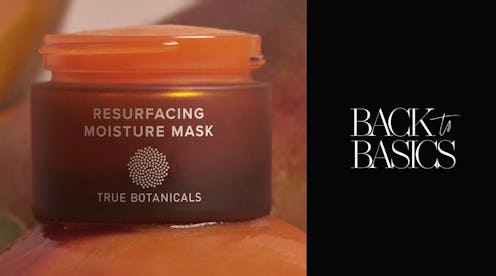(Beauty)
Why Some Derms Prefer This Hydrating Skincare Ingredient Over Hyaluronic Acid

With new product brands, launches, and categories popping up every day, beauty can be a bit overwhelming. Back to Basics, our new rudimentary beauty series, serves as your crash course on the science behind some of the best formulations in the game.
Check the ingredient list on your nearest moisturizer and chances are you'll see the name "glycerin" somewhere there. The compound, derived from animal or plant fats, has garnered a reputation for its healing and hydrating properties, and glycerin in skincare has become commonplace in most of the mass and prestige moisturizers, serums, and cleansers on the market.
The naturally occurring humectant (a substance that preserves moisture) is found in animals, plants, and humans. However, when it comes to sourcing to skincare products, the odorless compound is extracted from soybeans, cane, or corn syrup sugar, resulting in a clear, gel-like, texture. Its benefits, along with praise from organizations such as the Food And Drug Administration, have made it an ideal ingredient for all skin types. According to data found in a 2019 study by the United States FDA's Voluntary Cosmetic Registration program, glycerin is the third most popular ingredient found in beauty products, just behind water and fragrance. It was reported to be incorporated in 23,366 cosmetics spanning skincare, makeup, baby body care, and dental products.
"Glycerin is an excellent ingredient for skin hydration and can be considered fundamental to most good moisturizers," Dr. Blair Murphy-Rose, MD, FAAD, board-certified dermatologist says. "It helps to balance the moisture level of skin and prevent dryness by attracting water, drawing moisture from the air to the skin’s surface." And according to a study by the Asian Journal of Beauty and Cosmetology, some prefer it over cult-favorite hyaluronic acid for its ability to help the skin retain moisture. As glycerin is a smaller molecule, it absorbs deeper into the skin than hyaluronic acid, which, due to its larger size, sits atop the skin.
But it does more than just moisturize. "Glycerin is also naturally antimicrobial and antiviral," Hillary Peterson, founder of True Botanicals, says to TZR. "It's considered by the FDA as a treatment for wounds and inflammation, which is why it is also common in body products. Additionally, this makes it extra beneficial to use in cleansing formulas as it has the ability to dig deeply into the skin by removing excess oil, dirt, and even makeup without drying it out."
And if you have oily skin, glycerin has even more powerful benefits. "Because it doesn't occlude water to keep moisture in, it is often part of an oil-free moisturizer," Dr. Rose says. "It can hydrate skin without making it produce excess oils."
While we often assume that there's no such thing as too much hydration, that's not the case for glycerin. "Like other humectants, glycerin is typically used in concentrations that are appropriate for the skin in order to prevent excessive water loss from lower layers of the skin," Dr. Rose says. "So in theory, yes, too much glycerin could be problematic to the skin. A pure, 100-percent humectant could pull too much moisture from lower skin layers but it is never used in pure form. Instead, it is formulated for the skin in much lower concentrations."
Therefore, Dr. Rose says it is only truly effective when blended with other hydrating ingredients. "Glycerin works best in combination with other emollients and skin-replenishers," Dr. Rose says. And while the assumption may be that a humectant and an emollient are the same thing, that's not the case. Emollients are meant to soften the surface of the skin and often contain lipids or silicones, while humectants act to increase the water content of the skin itself, trapping the moisture induced by the emollient. That said, Peterson suggests complementing glycerin with formulas loaded with nutritive ingredients such as antioxidant-rich botanicals and essential fatty acids. "It blends well with oil, butter, and water-based formulas — as long as it’s emulsified," she says.
So when incorporating glycerin into your skincare routine, be cautious of how much you use. "Glycerin is an ingredient that should be used sparingly. Too much glycerin can slow absorption and make a product feel greasy," Peterson says. And while it's great to use both during the day and at night, Peterson suggests using a lighter formula during the day. "As products with glycerin tend to be heavy, daytime formulas with a small amount of glycerin are preferred," she says.
We only include products that have been independently selected by The Zoe Report's editorial team. However, we may receive a portion of sales if you purchase a product through a link in this article.